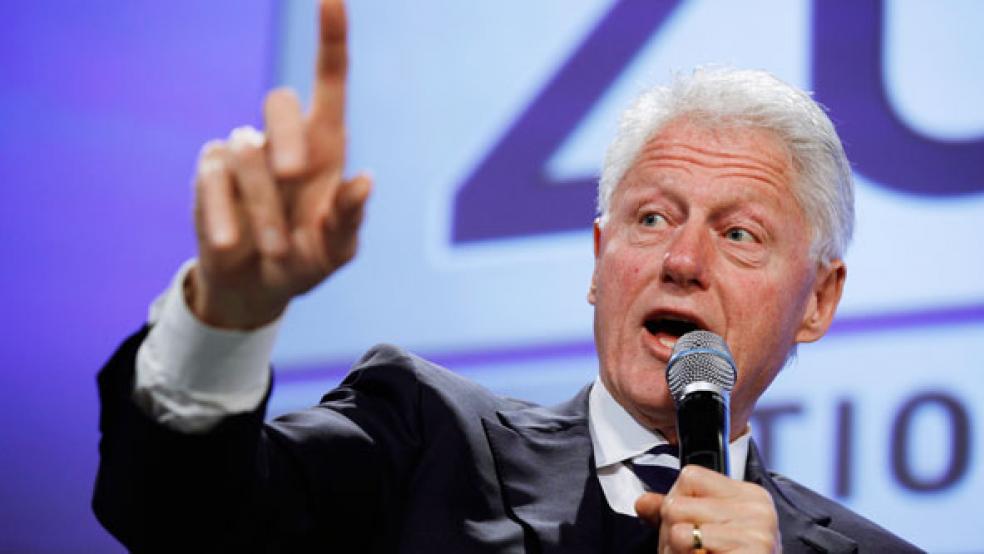Few understand the difficulty and importance of balancing the budget like Bill Clinton, who on Tuesday exposed some of the false choices in the current debate about how to manage the nation’s finances.
“The problem is the nature of the debate goes to one factual dispute and the core of the political differences between the two parties in Washington today,” the former president said at The Fiscal Summit, sponsored by The Peter G. Peterson Foundation.
It’s a simple disagreement over taxes and entitlements.

GOP lawmakers tout the importance of having a surplus in ten years, but oppose at all costs any efforts to increase taxes. Democratic congressmen strive to protect entitlement programs from overhauls that would slash expenditures, calling instead for higher taxes on wealthier Americans.
RELATED: For Team Obama, a Rocky Road to a Grand Bargain
As a result of this fundamental breakdown, political leaders have tried to reduce the debt by hacking into the kind of discretionary spending in research, education and infrastructure that fuels growth decades over time. This approach prevents both steep tax hikes and chopping into Medicare and Medicaid for the moment, but it theoretically puts the economy and the federal debt in a worse place decades from now.
“We choose the present over the future,” said Clinton, whose negotiations with congressional Republicans produced a budget surplus in 1999 and 2000.
The Democrat hailing from Arkansas said he favors the kind of immediate stimulus being championed by Nobel prize-winning economist Paul Krugman, but it should be accompanied with a long-term framework on reducing the federal debt burden.
President Obama has signed onto agreements such as the 2011 Budget Control Act that cut discretionary expenses – sparing entitlement programs – and failed to put a real dent in the federal debt load.
The spending cuts largely excluded mandatory expenditures such as Medicare, while the tax rate increases from this year’s fiscal cliff deal are also insufficient for closing the gap.
The $85 billion in sequestration cuts this year to the Pentagon and discretionary programs is expected to crimp growth without changing the basic trajectory of federal debt. Within 10 years – based on Obama’s 2014 budget proposal—the government will spend more on interest than national security or its discretionary programs.
“All we did is postpone the problem,” said Michael Peterson, president and chief operating officer of The Peterson Foundation.
Pete Peterson, the former Commerce secretary who is the chairman and namesake of the foundation, said more of the focus should be on the long-term debt instead of the deficit, saying that emphasis would mean adopting policies with shared sacrifice. “Sacrifice is a word that makes many politicians’ blood run cold,” Peterson said.
Timing matters with the debt – an element that often gets overlooked in the political demagoguery.
Reduce the annual deficit too sharply, too soon, and the economy sours. Slow growth leads to even bigger debt headaches – as witnessed by the failure of austerity in Europe. But delay structural reforms to control the price of mandatory programs and the rising debt load will spark a surge in interest rates that would also suffocate growth.
“It will make the sequester look like a Sunday afternoon walk in the park,” Clinton said.
So how would Clinton fix this? The former president said the nation needs a five-year window to see whether Obamacare controls health care costs. Since the price of medical treatment has been two and even three times the rate of inflation, programs such as Medicare and Medicaid are projected to be the source of America’s debt problem.
Lower health care costs would translate directly into less debt, yet as Microsoft founder Bill Gates – who appeared on stage with Clinton – noted, “The amount of discussion about how you bend the curve on that really isn’t there.”
But Clinton sees discussion of collecting more in tax revenues as a non-starter for Obama, saying that the current climate practically makes it impossible to hash out a significant compromise. “All the president can do is keeping his proposals and playing golf with Republicans,” Clinton said.
Pete Peterson funds The Fiscal Times, an independent news and opinion organization, as a private venture. The Fiscal Times is not associated with The Peter G. Peterson Foundation.




